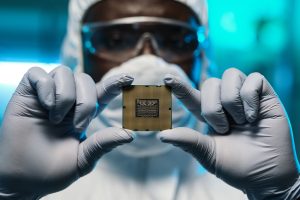Quantum leap: Google’s chip outpaces the world’s fastest supercomputers!
Mountain View, CA – Google has announced a groundbreaking advancement in quantum computing, unveiling a quantum chip that it claims is significantly faster than the world’s most powerful supercomputers. The announcement marks a pivotal moment in the evolution of computational technology, with implications for science, cryptography, artificial intelligence, and beyond.
What Makes Google’s Quantum Chip Unique?
Dubbed the Sycamore X2, the quantum chip leverages advanced qubit architecture and error-correction techniques to perform calculations at unprecedented speeds. According to Google’s research team, the chip completed a complex computation in seconds—a task that would take conventional supercomputers thousands of years.
Google’s Sycamore X2 builds on the success of its predecessor, Sycamore, which achieved quantum supremacy in 2019. Quantum supremacy is the term used when a quantum computer performs a practically impossible task for classical computers. With the new chip, Google is setting the bar even higher, pushing the boundaries of what quantum computers can achieve. “Our advancements in quantum hardware and algorithms have resulted in a system that is not only faster but also more reliable than ever before,” Google stated in its official blog. “This milestone reaffirms our commitment to unlocking the full potential of quantum computing.”
Comparing Quantum Chips to Supercomputers
Supercomputers like Fugaku, located in Japan, and Frontier, based in the United States, represent the pinnacle of classical computing power. These machines execute quadrillions of calculations per second, making them indispensable for weather modeling, drug discovery, and simulating nuclear reactions.
However, quantum chips operate on an entirely different paradigm. While supercomputers process data in binary bits (0s and 1s), quantum chips use qubits, which can represent 0 and 1 simultaneously due to the principle of superposition. This capability enables quantum computers to solve problems exponentially faster than classical systems. In a recently published study, Google demonstrated that Sycamore X2 performed a computation involving highly entangled qubits in under five seconds. The same task would take Frontier—the world’s fastest supercomputer—an estimated 10,000 years.
Implications for Industry and Research
Google’s quantum chip has vast and transformative potential applications. Fields such as cryptography, where quantum computers can break traditional encryption methods, and material science, which can simulate molecular interactions, benefit immensely.
“Quantum computing has the potential to revolutionize entire industries,” noted the World Economic Forum’s Quantum Technology Insight Report. “The ability to perform rapid, complex computations opens doors to solving problems previously deemed intractable.” Additionally, quantum advancements could accelerate breakthroughs in artificial intelligence, enabling more sophisticated machine learning algorithms and natural language processing capabilities.
Challenges in Quantum Computing
Despite the impressive progress, quantum computing is still in its infancy. One of the primary challenges is error correction. Quantum systems are highly susceptible to environmental noise and operational errors, which can disrupt calculations. Google’s Sycamore X2 reportedly incorporates advanced error-correction protocols, marking a significant step forward in overcoming this hurdle. Another challenge lies in scalability. Building larger, more stable quantum systems that can handle practical applications remains a monumental task. However, Google’s latest development brings the industry closer to achieving this goal.
The Race for Quantum Supremacy
Google is not alone in the quantum race. Tech giants like IBM, Microsoft, and emerging startups also invest heavily in quantum research. IBM’s Eagle processor, for instance, boasts a 127-qubit architecture and aims to tackle real-world problems within the next decade. Governments also prioritize quantum research, with countries like China, the United States, and the European Union allocating billions of dollars to quantum initiatives. This global competition underscores the strategic importance of quantum technology in shaping the future.
Google’s announcement of its quantum chip represents a remarkable milestone in computational science. While the technology is still evolving, the rapid advancements in quantum computing signal a future where problems once impossible become solvable. As Google and its competitors push the boundaries, the world edges closer to a quantum-powered era.




